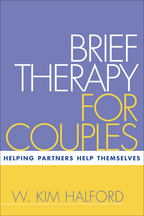Brief Therapy for Couples
Helping Partners Help Themselves
W. Kim Halford
HardcoverPaperback
Hardcover
orderMarch 12, 2001
ISBN 9781572301795
Price: $62.00 288 Pages
Size: 6" x 9"
Paperback
orderAugust 27, 2003
ISBN 9781572309715
Price: $41.00 288 Pages
Size: 6" x 9"
Sign up for emails on upcoming titles on Families & Couples (with special discounts)!
“Halford brings to this book many years of research and direct clinical practice with couples. Halford's experience is evident in the richness of detail and comprehensiveness of his work. Although I am an older and skeptical clinician, after reading his book I was eager to begin applying Halford's model to my practice....Succeeds nicely in being an understandable presentation of SRCT theory and in providing a very user-friendly clinician's manual....One could use the book just for its richness of techniques. But that would be missing its greater value, which is a clear presentation of a brief but comprehensive and flexible form of couples therapy that aims to develop in two people their own ability to change their relationship.”

—Psychiatric Services
“As any therapist can attest, working with couples happens to be one of the most challenging aspects of counseling. There are so many dynamics going on; the therapist must be coach, referee, teacher, trainer, and miracle maker! This author takes these complex roles and makes them simpler and sensible....If you are looking for a couples counseling book that is a marvelous guide packed with useful information, then you have struck gold with this one!”

—The Family Journal
“This book is exciting and stimulating, providing a great example of the combination of science and practice that characterizes good therapy. With his new approach, self-regulatory couple therapy, Halford has successfully expanded upon traditional behavioral marital therapy. Building on the resources of each partner, couples are empowered to define and build the sort of relationship they want. The book is remarkably systematic and clear and features rich clinical examples. Rather than being a cookbook, it encourages the creative application of general principles to the unique problems of each couple. This is a highly valuable text for novice and experienced therapists alike.”

—Professor Dr. Kurt Hahlweg, Technical University of Braunschweig, Germany
“This is among the most helpful guides to couple therapy that I have come across in quite some time. It will be valuable to researchers, clinicians, graduate-level instructors, and students as it offers a rare blend of sound clinical advice, a strong empirical foundation, and a 'how to' primer. Halford provides a bridge between where the field of cognitive-behavioral couple therapy has been and where it needs to go. Thus, while self-regulatory couple therapy is a new approach, it does not require a leap of faith from techniques that are already tried and true. Brief Therapy for Couples is a compelling read for those of us treating couples for whom traditional cognitive-behavioral techniques fall short. I enthusiastically recommend this book.”

—Tamara Goldman Sher, PhD, Institute of Psychology, Illinois Institute of Technology
“Reading this book made me want to put Halford's ideas into immediate use in my own clinical work. Especially useful is the emphasis on the ability of individuals to bring about their own changes. The book packs a wallop by challenging whether long-term interventions are really needed for many couples. It also offers an excellent review of the couple therapy literature, written in a clear, practical fashion. I will highly recommend this book to graduate students and practicing therapists.”

—K. Daniel O'Leary, PhD, Department of Psychology, State University of New York at Stony Brook
—Psychiatric Services
“As any therapist can attest, working with couples happens to be one of the most challenging aspects of counseling. There are so many dynamics going on; the therapist must be coach, referee, teacher, trainer, and miracle maker! This author takes these complex roles and makes them simpler and sensible....If you are looking for a couples counseling book that is a marvelous guide packed with useful information, then you have struck gold with this one!”
—The Family Journal
“This book is exciting and stimulating, providing a great example of the combination of science and practice that characterizes good therapy. With his new approach, self-regulatory couple therapy, Halford has successfully expanded upon traditional behavioral marital therapy. Building on the resources of each partner, couples are empowered to define and build the sort of relationship they want. The book is remarkably systematic and clear and features rich clinical examples. Rather than being a cookbook, it encourages the creative application of general principles to the unique problems of each couple. This is a highly valuable text for novice and experienced therapists alike.”
—Professor Dr. Kurt Hahlweg, Technical University of Braunschweig, Germany
“This is among the most helpful guides to couple therapy that I have come across in quite some time. It will be valuable to researchers, clinicians, graduate-level instructors, and students as it offers a rare blend of sound clinical advice, a strong empirical foundation, and a 'how to' primer. Halford provides a bridge between where the field of cognitive-behavioral couple therapy has been and where it needs to go. Thus, while self-regulatory couple therapy is a new approach, it does not require a leap of faith from techniques that are already tried and true. Brief Therapy for Couples is a compelling read for those of us treating couples for whom traditional cognitive-behavioral techniques fall short. I enthusiastically recommend this book.”
—Tamara Goldman Sher, PhD, Institute of Psychology, Illinois Institute of Technology
“Reading this book made me want to put Halford's ideas into immediate use in my own clinical work. Especially useful is the emphasis on the ability of individuals to bring about their own changes. The book packs a wallop by challenging whether long-term interventions are really needed for many couples. It also offers an excellent review of the couple therapy literature, written in a clear, practical fashion. I will highly recommend this book to graduate students and practicing therapists.”
—K. Daniel O'Leary, PhD, Department of Psychology, State University of New York at Stony Brook



